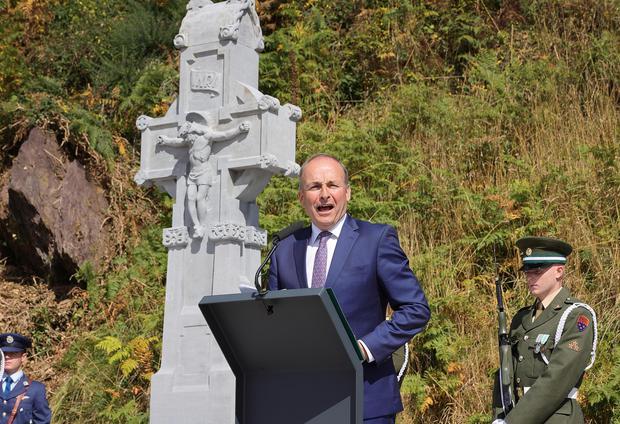The "Big Fella"
The Michael Collins Myth and the Triumph of Reaction
23 August 2022

Taoiseach Micheál Martin speaking
at the Memorial to Michael Collins.
The Irish Taoiseach, Micheál Martin, made history on Sunday Aug 21 as the first serving Fianna Fáil Taoiseach to speak at the commemoration in West Cork to mark the death of Michael Collins.
However, the new united front of the major capitalist parties marks the beginnings of a death rattle rather than a cry of triumph. Collins had been used as the standard bearer of the right-wing Fine Gael party, restoring order after the War of Independence and building the structures of the "Free State" in a partitioned country. Fianna Fail arose from the republican movement he had oppressed and was much more suspicious of his legacy. However, even amongst their ranks many believed that he would have pressed on to resist the reaction that grew after his death. Now both parties unite in his praise
The Collins illusion is made possible by what appears to be a contradictory role in the independence struggle. He is recognised as a supreme military leader and civilian administrator in the war of independence. He then became the foremost leader of the pro-treaty "Free State" forces, using British guns and state terror to impose the settlement. The component of his personality that resolved this contradiction was his ingrained militarism, a pervasive illusion in Ireland, where military ruthlessness is conflated with a revolutionary programme.
The Fianna Fail/Fine Gael coalition is uniting around Michael Collins because they, in today's world and in line with his legacy, have eaten further into Ireland's limited political independence, enforced the economic power of imperialism and have moved to cement the continuation of partition through a shared Island concept that preserves the status quo. They are now so unpopular that, even ruling jointly, they are unable to command majority support.
In part the renewed support for Collins is seen as a shield against the growing electoral support for Sinn Féin. This shield is unlikely to work. Admiration for Collins was well established in Sinn Féin and blossomed following the Peace Process. It is well known that Gerry Adams liked the flattery of being compared to the "Big Fella". More broadly it's impossible to ignore the comparisons between the Treaty and the current peace process, where a military organisation adopts a political settlement and swings 180? in its programme.
It's claimed that military superiority and greater popular support led to the victory of Collins and the Free State in the Irish Civil War. Socialists argue that it was the failure of the republicans to adopt a working-class programme, alongside the neutrality of the Irish Labour movement, that led to defeat.
The Good Friday Agreement is seen as easing Ireland towards a gradual and peaceful unity, yet within months a Brexit government in Westminster could move towards a new Irish land border. Capitulation to the European Central Bank and transnational capital was seen as bringing stability, yet a failed housing provision, public services and social inequality are eating away at society.
Just as at the time of Collins' death, the starting point for resistance is a socialist and working-class alternative. None of the current political actors will provide this, so the possibility of organising for revolution is slowly growing.